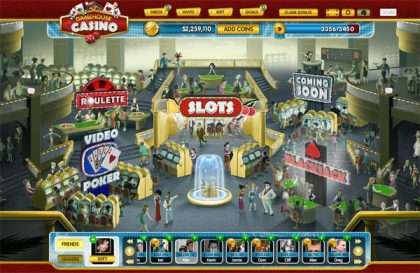When Does Social Gaming Become Gambling?
Social gambling has been around as long as the Internet. While real-money gambling was cutting its teeth as Windows 2000 users struggled to get past the 56k modem speeds, fun-play casino games jostled for space alongside some of the first online poker games.
In fact, some of the ‘boom’ generation of online poker players took to Texas Hold’em via a fun play-money client on Yahoo (you remember them, don’t you?) before transferring their skills to the swathe of new real-money sites.
Meanwhile, with the rise of Facebook, Zynga Poker – and more recently, Bingo Friendzy – have taken the explosion in ‘social gaming’ and tried to tap into real-money gambling for over-18s. More recently, play-money versions of top slots can be enjoyed on apps like MyVegas and JackpotJoy.
But where does the social element stop and the gambling begin? And with the lines being blurred ever more, is the notion of gambling in the traditional sense changing too? Is social gambling helping to reduce the “vilification” of gambling and if you sit at your computer for 12 hours pestering friends with your latest achievement on Farm-bloody-ville, are you a gambler in disguise?
A Crush On Candy Crush
Players on social apps like Candy Crush Saga (Facebook’s most popular social game of last year) can play for free but to get past the initial levels they must purchase more levels or scrounge extra lives from FB friends.
But the aims are the same: to spend as much time playing as possible and to ‘achieve’ as much as you can. And those achievements and missions can be shared with friends on social media.
Online gambling firms are starting to cotton on. Online poker site PartyPoker introduced ‘Achievements’ in their recent poker site revamp which sees players awarded shields and merits for reaching certain milestones (knocking out 10 players, hitting pocket aces, etc).
An online casino, Casumo, operates a similar awards scheme, and the redesigned lobby (as with Party) is entirely geared at a young, web-savvy player who interacts well with easy-on-the-eye graphics and quick links.
Dr. Mark Griffiths is Professor of Gambling Studies at Nottingham Trent University’s International Gaming Research Unit. He noticed a gradual ‘blurring of the lines’ back in 1991 when describing video games as a form of gambling, with much raising of eyebrows from the industry.
“What I was trying to argue was that there was very little difference between the behaviour and the psychology of people playing video games and those playing slot machines,” he told us.
“[The only difference was that] slot machine people were playing for money and video games players were playing for points. In effect, slot machine gamblers were using money as a way of ‘keeping score’, even though the games involved money.
“Every hardcore fruit machine player that I knew in my research in the late 1980s was saying, ‘we know that we’re going to lose every penny in the long run, what we’re trying to do is maximise play on this machine'”.
Slots players’ philosophy, Dr. Griffiths argued, was to stay on machines as long as possible for the least amount of outlay possible; an identical approach to video games players.
“People obviously have to pay upfront to buy credit on [new] social games, whether you’re playing Texas Hold’Em poker or Slotomania [a free-to-play slots app on Facebook],” he adds.
“You’re still buying virtual currency, but while you’re not actually losing any money, the behavioural and psychological principles involved that keep you gambling again and again are very much there.
“That’s why on games like Slotomania, for instance, you win back more than 100% of what you’ve put in. [If] you thought that happened in real life you’d be gambling all the time.”
Skewing the Odds
In a recent interview with online slots site VegasSlotsOnline.com, game mathematician Diane Gruber highlighted the fact that social slots are able to skew the odds in favour of the player to give them bigger wins.
“You can completely control the player experience,” she says.
“You can make their luck run in streaks, you can give them volatility like a rollercoaster, you can change the RTP (Return to Player percentage) so they win all month and go broke on payday.”
Dr. Griffiths says that the behavioural and social conditioning of social slots and gaming is no different to real-money gambling, apart from the fact you’re not “risking” real money:
“At some later point, players can think, ‘God, if I’d played this for money I could’ve won this. There’s always that possibility that people will think that by playing for real money they’ll be getting those odds that they were getting in those social gambling events. And, of course, that’s not the case at all.”
The Addiction of Social Gaming
In fact, there are certainly signs that addiction in youngsters on so-called “freemium” games, which start off free but require investment down the line to progress, has led to high-profile stories in the media about kids racking up huge bills on their parents’ credit cards.
In 2013, two boys managed to spend over £3,000 buying virtual animals on a popular social game. All that was needed was a simple, easy-to-remember password. Only when the boys’ Dad – an English rugby player – got a bill from iTunes did he realise what had happened.
“In my years of work on technological addiction I say that with a lot of forms of technology people can basically spend hours and hours on this because of psychological techniques used when people are playing,” says Dr. Griffiths.
“People don’t have to lose money…I can tell you now if you’re an online poker player and you may be winning on the whole, if you’re spending maybe 14 hours a day doing that then that, in and of itself, is problematic.
“It’s not just about money loss. The time loss can be equally important in terms of the negative impact on somebody’s life.”
The Monetisation of Social Gaming
Over the past few years, every firm with a popular social game, whether it’s Chumba World, Zynga Poker or Candy Crush Saga, has attempted to monetise their games.
Chumba World, the crowd-funded game from Aussie start-up, Virtual Gaming Worlds, recalls popular ‘sim’ games from the early ’90s like The Sims or Theme Park.
In the game, you build and manage virtual casinos, with games like roulette and blackjack incorporated.
Despite having troubles with their Kickstarter funding, Chumba Casino is now available to over-18s play casino games for real money via Facebook. The social casino bases its games on sweepstakes in order to pay out real cash winnings.
Social Gaming and Regulation
Interestingly, despite games like Chumba World being developed Down Under, under the Australian Interactive Gambling Act 2001 both social gambling involving purchases and real-money online gambling are prohibited.
Similarly, the new Nevada online gambling licenses, introduced recently to oversee a new wave of poker sites, govern social gambling too. No such distinctions are yet in place in the UK.
“In terms of social gambling at the moment, [because] you’re not playing for money the Gambling Commission will say that [it] doesn’t necessarily need to be regulated,” says Dr. Griffiths.
“I don’t think we have hard enough empirical or scientific evidence to show that it needs to be regulated [but] it’s an issue that’s on my radar, on other people’s radar and the Gambling Commission has kept it under review.
“Of course, what we’re seeing is lots of blurred lines between gambling gaming, social gambling, and social gaming.”
Blurred Lines
Of course, where social gambling pioneers fail is when they try to monetise their games in the wrong way.
Zynga Poker, the social online poker operator who boast more players than any real-money site, attempted a doomed move into real-money poker.
Despite moving into real-money games in 2013, the firm’s downloadable client, ZyngaPlusPoker, was shut down in the UK earlier this year. For now, the flirtation with traditional real-cash gambling is over.
“I think [the industry] thought there was a new breed of gambler out there that would just gamble via social network sites. To me that looks as if that just hasn’t happened,” says Dr. Griffiths.
“Those people who are gamblers and want to gamble still will gamble on those sites. Those people that are playing gambling-type games without the risk of actually spending anything are still playing those games and there doesn’t seem to be this group in the middle that both like playing those social games and are prepared to spend lots of money on it.”
It seems that the distinction between online gambling for money, social gambling that requires time and money to progress will continue to blur even more as the web-literate youngsters come of age and gambling online becomes ever more acceptable.
In the next article, we’ll look at how online slots tap into brand recognition and nostalgia to create a warm, cosy place that we can all disappear into – and lose our hard-earned cash.




















Excellent story. I was never much into social gaming, and I just recently ran into the “need to purchase access to higher levels” thing while sampling some online play-slots on Yahoo!. One of the problems I see is that all these social-gaming sites struggle with the conversion of play-money players to real-money purchasers, in much the same way online-poker sites used to offer scads of freerolls, only to discover those freerollers were notoriously difficult to convert.